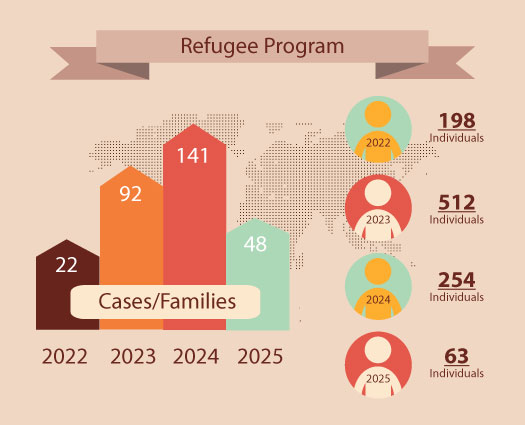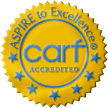
Catholic Charities Refugee Services
Catholic Charities Community Services has been welcoming and resettling refugees in Arizona from all parts of the world since 1975. As a national leader in refugee resettlement, our team of staff and volunteers work together to provide a welcoming and supportive network to help refugees who are new to our country quickly gain independence and become productive members of their new community.
Provide Life Saving Help to Refugees!
Who are Refugees?
Refugees flee their country of origin to save their lives. They run from war and persecution, often having to leave behind family and friends. They are granted refugee status due to a well-founded case of persecution based on race, religion, nationality, membership in a social group or political opinion.
Only 1% of refugees are ever resettled in a new country and 70% of refugees will live in a refugee camp for 10 years before being resettled in a new country like the United States.
Refugee Resettlement in Arizona
Catholic Charities is one of eight refugee resettlement agencies in Arizona. Once the Catholic Charities team learns that a refugee individual or family is scheduled to arrive, our team will find and set up an apartment, complete with basic furniture, kitchen items and food staples, hygiene products and basic bedding. A Refugee Resettlement case manager will pick up the client at the airport and take them to their apartment. Our team provides immediate support as refugees become familiar with their new environment. This support includes but is not limited to the following:
- enrolling children in school
- English language courses
- introduction to medical care
- job readiness and resume building
- introduction to public transportation
The goal is to achieve self-sufficiency as soon as possible.

Where are refugees from?
Some of our refugees come to us from Iraq and Afghanistan, where helping our military efforts have put their lives in danger. Others come from countries like Sudan and Burma, where ethnic discrimination has deprived them of their homes and livelihoods. Still others escape from war-torn countries, like the Democratic Republic of the Congo, and human trafficking situations.
How to Help Refugees
There are many ways you can help Catholic Charities refugee clients. We have urgent needs for volunteers, storage, supplies, community placements and unaccompanied refugee minor foster families. Additionally, there is a great need for employers to hire refugees.
Volunteers
Families, parishes and community groups can volunteer in many ways. There are short term opportunities like hosting a donation drive for home essentials like sheets, towels, hygiene supplies, etc. We also have longer term opportunities to make a lasting impact. These include:
- Teaching English as a Second Language or tutoring
- Cultural Orientation
- Apartment set up
- Mentor for youth
- Transportation
- Sorting donations
- Office or professional assistance/skills
- Foster Care and Community Placements
Current Material Needs
Our clients continuously need household items like cookware, hygiene products, diapers, cleaning supplies and more. Please view our Amazon Wish List for our current, most needed items.
All volunteers who come in contact with clients must undergo extensive screening and background checks. This important step helps protect our vulnerable clients.
Unaccompanied Refugee Minors
Unaccompanied Refugee Minors are refugee children without a parent or guardian, who are eligible for resettlement in the U.S. Children are placed in foster care, enrolled in school and receive medical and dental care and have access to counseling services. Learn more about Unaccompanied Minor Foster Care.
Our team provides support to the child, the foster family or community placement and on-going case management to help prepare the client for independent living. Many clients will transition to an independent living apartment or community placement on their way to self-sufficiency.
Community Placement
Former foster youth who are participating in the Semi-Independent Living Program are in need of community placements. Community Placements allow clients who are 18 years old or older to be placed in a home without a foster care license. This option is seen as more of a mentoring role and allows the client to learn about living independently with the benefit of a safety net and mentor. The client would rent a room from the family with a portion of the small stipend they receive.
Our team provides support to the child, the foster family or community placement and on-going case management to help prepare the client for independent living. Many clients will transition to an independent living apartment or community placement on their way to self-sufficiency.
Employing Refugees
Finding work is the quickest way for refugees to integrate into their new community and to become independent as they build a new life for themselves and their families. Refugees are eligible for employment upon entering the U.S.
Learn more about hiring refugees and how Catholic Charities can help support your efforts.
-
Unaccompanied Refugee Minors are refugee children without a parent or guardian, who are eligible for resettlement in the U.S. Children are placed in foster care, enrolled in school and receive medical and dental care and have access to counseling services. Learn more about Unaccompanied Minor Foster Care.
Our team provides support to the child, the foster family or community placement and on-going case management to help prepare the client for independent living. Many clients will transition to an independent living apartment or community placement on their way to self-sufficiency.
-
Former foster youth who are participating in the Semi-Independent Living Program are in need of community placements. Community Placements allow clients who are 18 years old or older to be placed in a home without a foster care license. This option is seen as more of a mentoring role and allows the client to learn about living independently with the benefit of a safety net and mentor. The client would rent a room from the family with a portion of the small stipend they receive.
Our team provides support to the child, the foster family or community placement and on-going case management to help prepare the client for independent living. Many clients will transition to an independent living apartment or community placement on their way to self-sufficiency.
-
Finding work is the quickest way for refugees to integrate into their new community and to become independent as they build a new life for themselves and their families. Refugees are eligible for employment upon entering the U.S.
Learn more about hiring refugees and how Catholic Charities can help support your efforts.
Frequently Asked Questions about Refugee Resettlement
Are refugees vetted before coming to the U.S. to live? +
The United Nations High Commissioner for Refugees (UNHCR) is the international organization that screens and determines which individuals qualify as refugees. After that, refugees go through more screenings and interviews by federal and international authorities. This process can take several years.
What is the refugee resettlement process? +
Refugee resettlement agencies are tasked with finding housing and basic furniture and necessities for refugees entering the U.S. Refugees are picked up at the airport and brought to their new home. Next, the resettlement agency case manager will introduce them to resources to being working and address any medical needs. English language classes and tools are also introduced. Once those immediate needs are addressed, case managers will assist with clients with educational needs like getting children enrolled in school, facilitate connections to the community like local faith communities, and refer clients to other resources as needed.
How are refugees from Afghanistan coming to the U.S. so quickly? +
When the Taliban invaded Kabul in 2021, many Afghans fled. Some of these incoming refugees are coming through the refugee resettlement process as Special Immigrant Visa Holders (SIV). Additionally, there is also a large group of Afghans who under emergency conditions were evacuated, who have not been able to go through the standard refugee process and are being processed overseas. They will be paroled (admitted) into the United States for urgent humanitarian protection.
What is the difference in a SIV and a Parolee? +
Refugees holding SIVs are mainly individuals and their families who worked with the U.S. military or U.S. government in some capacity. They have been granted official refugee status and are assigned to a qualified refugee resettlement agency by the U.S. government. These individuals and their families will be qualified for federal and state benefits for housing, medical and some food assistance as well as be qualified to work in the United States. Parolee is the term the U.S. government is using to refer to those who have been evacuated by the U.S. government that have not yet been granted refugee status. They will go through a background check and screening process before arriving to resettlement agencies like ours and will be assisted in applying for employment authorization.
Are refugees from the Ukraine coming to Arizona? +
In March 2022, the White House announced that it would admit Ukrainians to the U.S. We expect that many will come to Arizona. We will make more information available in the future.
How I can I help refugees? +
There are many ways to help Phoenix area refugees. Individuals, community groups and businesses can organize a donation drive for household items and deliver them to our refugee program. Individuals and parishes can also volunteer to help set up an apartment, tutor or provide English language instruction, or lend your professions skills to our program or toward vocation training. All volunteers who come into contact with clients are required to undergo background checks and security screenings.
Help is Needed Now
Catholic Charities is deeply committed to assisting families who have come to our community from various parts of the world, including the Middle East, Africa, Latin America, and beyond. These refugees have been forcibly displaced from their homes, fleeing war, violence and persecution, and have been legally resettled in the U.S.
Due to recent policy changes and funding freezes, we find ourselves unable to continue providing necessary support for our most recent arrivals. Consequently, these families are increasingly vulnerable, and many are now facing the imminent threat of eviction and are going without basic necessities. This situation has driven us to seek assistance from the local donors, faith communities, and other private organizations.
Will you help us support refugees who are legally here now? Helping them would ensure they can keep a roof over their heads and basic needs are met, offering some stability for their children and families during these rapidly challenging times.
Even better – we have a $25,000 MATCHING GIFT supporting refugees now!
Every gift will be matched – up to $25,000!
- Your $50 = $100
- Your $100 = $200
- Your $500 = $1,000
Thank you for helping fill the funding gap for refugees, empowering them to become valuable contributors to our community.
Candid Profile | Terms of Use | Privacy Policy | Employee Login and Support | Board Member Login
Notice of Privacy Practices | Notice of Privacy Practices - My Sisters’ Place
Catholic Charities is committed to making reasonable accommodations to the special needs of individuals with disabilities meeting the eligibility requirements of all versions of the Americans with Disabilities Act (ADA) so these persons have access to available employment opportunities and services.
To contact us if you are deaf or hard of hearing, please dial 7-1-1 to access the free telecommunications relay service.



